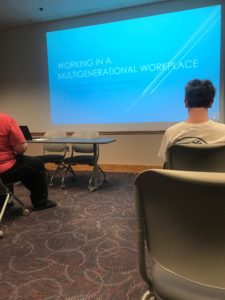
Room full of WCU students participated in the workshop on working in a multi-generational office, on Oct. 26, 2017. Photo by Chelsea Komer.
Every generation has a story: One that they create and mold throughout the years, and one that the previous generation passes on.
Each story is different from the generation before or after and this can lead to conflict in most environments, specifically within a workplace.
Around 40 WCU students gathered in the UC’s conference room on Thursday, Oct. 26, for the Working in a Multi-Generational Office workshop.
The workshop was created and ran by The Center for Career and Professional Development as well as the University’s DegreePlus initiative.
At the start of the hour, Associate Director of DegreePlus, Marti Newbold, introduced the event and passed out business cards, as well as information about participating in future research with DegreePlus.
Afterward, student development coordinator, Carrie Hachadurian, began the workshop with a basic information session and discussion on different generations, such as Baby Boomers, Millennials and what she described as “Digital Natives,” or Generation Z.
“Generational studies helps us contextualize a group of people. It helps us understand what perspectives they can offer,” said Hachadurian.
An idea that was made relevant throughout was understanding and contextualization: To understand where each generation is coming from would mean that there is a comprehension of any misunderstanding, assumption or expectation made that could cause conflict.
Major events and advancements in technology both work together to help shape a generation. People tend to forget that our own generation is created and ultimately affected by the one before it. Generation Z can thank the Millennials for their sophistication in technology because a lot of the advancements were being thought of and created during the 80s and early 90s.
As the workshop went on, students got a chance to share some of their own experiences within their generation. Some recalled their reactions to the tragic events on September 11, 2001 while others spoke up about how their parents and grandparents view the more recent generations.
With the hour coming to an end, students were then tasked with one last discussion: A group activity with assigned scenarios. Once the groups were created, they were given different scenarios that all had multi-generational conflicts within different workplaces. Groups would then discuss out loud how they would have managed the conflict with additional feedback from Hachadurian.
Communication professor, Dr. Betty Farmer, attended the workshop along with her Introduction to Professional Development class.
“I brought my COMM 296 Introduction to Professional Development class to this workshop because our students will be working alongside individuals hailing from five generations. Traditionalists, Baby Boomers, Generation X, Millennials, and Gen Z bring different values and expectations about work, in general, and balancing work and family, specifically,” said Farmer.
Farmer continued by saying that it is crucial that we understand why our coworkers believe and act the way they do, and that we mature our communication strategies in bridging generational differences.
The discussions held in the little time provided were respectful and informational. There were a few different generations present which appeared to help the conversations have diversity.
A millennial and a senior at WCU, Kaitlyn Sherlock, shared her thoughts about the workshop.
“I think this seminar would help others learn how to better interact with different generations because we as college students spend 90 percent of our time with people are same age,” said Sherlock.
October has been a busy month for the Center for Career and Professional Development. Several events and workshops have been created and successfully managed throughout the month. The most note-worthy event was Catamount Career and Networking Day earlier in October.
To follow student resources related to the CCPD, follow their Facebook, Twitter and YouTube.



